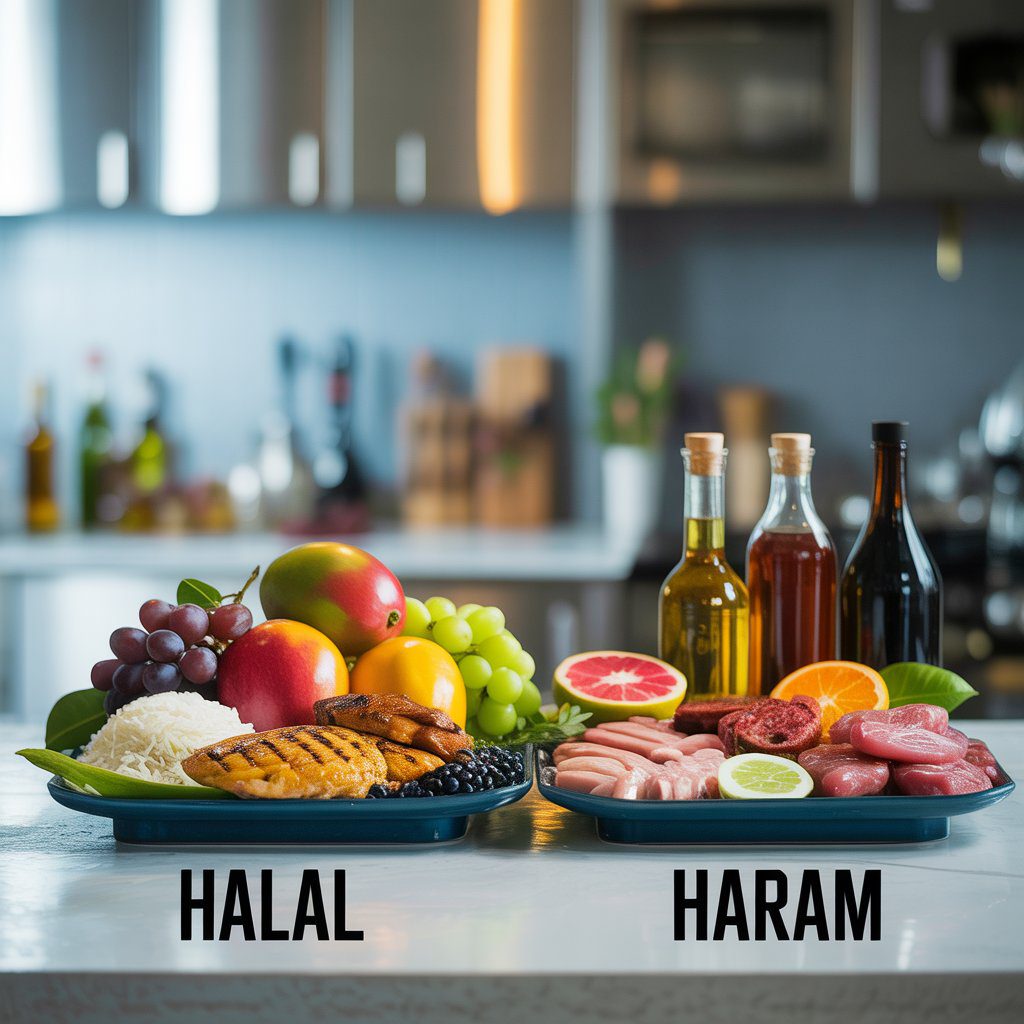Halal & Haram Eatables in Islam: What You Can and Cannot Eat as a Muslim
What are Halal Haram Eatables?

📚 Table of Contents
🔍 What Does Halal and Haram Mean in Islam?
🥩 Which Animals Are Halal to Eat?
🐷 Which Animals Are Haram in Islam?
🍗 How Meat Becomes Halal (Zabiha Process)
🌭 Halal or Haram? Common Supermarket Products Reviewed
🧬 Ingredients to Watch For: Gelatin, Enzymes, Alcohol & More
🛒 How to Identify Halal Food Products in Western Countries
🕌 Real-Life Story: A New Muslim’s Struggle With Grocery Shopping
💡 Final Checklist for Halal Eatables
❓ Top 10 FAQs (with Quran & Hadith References)
🔍 1. What Does Halal and Haram Mean in Islam?
In Islam, all aspects of life are guided by the will of Allah (God), including what we eat. The terms Halal (permissible) and Haram (forbidden) are core concepts in Islamic law (Shariah) regarding food, drink, and actions.
Halal: Anything that is allowed, permitted, or lawful as per Islamic teachings.
Haram: Anything that is strictly prohibited due to harmful, impure, or unjust characteristics.
📖 Qur’an Reference:
“O mankind, eat from whatever is on earth [that is] lawful and good…”
— Surah Al-Baqarah (2:168)
🐄 2. Which Animals Are Halal to Eat?
Islam permits the consumption of many animals if they are slaughtered properly according to Zabiha guidelines (we’ll discuss that below).
✅ Common Halal Animals:
Cows
Goats
Sheep
Lamb
Chicken
Turkey
Duck
Deer (venison)
Fish (all types are halal)
Camels
📜 Hadith:
“Its water is pure and its dead (sea creatures) are permissible to eat.”
— Sunan Abu Dawood 83
✨ Story from Seerah:
During one journey, the Prophet Muhammad ﷺ and his companions came across a beached whale. Despite it not being slaughtered, the Prophet ﷺ permitted them to eat it. This reinforced the ruling that seafood is halal even if not slaughtered.
🐷 3. Which Animals Are Haram in Islam?
Islam prohibits eating:
❌ Forbidden Animals:
Pigs (pork in all forms)
Carnivores (lions, tigers, wolves, etc.)
Birds of prey (eagles, falcons)
Donkeys & mules
Reptiles (snakes, lizards, etc.)
Dead animals (not slaughtered properly)
Animals sacrificed to idols
📖 Qur’an Reference:
“Prohibited to you are dead animals, blood, the flesh of swine, and that which has been dedicated to other than Allah…”
— Surah Al-Ma’idah (5:3)
🔪 4. How Meat Becomes Halal (Zabiha Process)
Even if an animal is halal in type (like chicken), it is not halal to eat unless it is slaughtered Islamically. This process is known as Zabiha.
🔹 Key Zabiha Conditions:
The animal must be alive and healthy at the time of slaughter.
The name of Allah (Bismillah) must be recited.
A sharp knife must be used to sever the jugular vein, windpipe, and blood vessels.
Blood must be fully drained.
📖 Qur’an Reference:
“So eat of that upon which the name of Allah has been mentioned…”
— Surah Al-An’am (6:118)
🌟 Real Example:
Once a companion asked, “O Messenger of Allah, we slaughter but we don’t mention Allah’s name.” He replied:
“Mention Allah’s name, and eat.”
— Sahih al-Bukhari, Book 72, Hadith 779
🧴 5. Halal or Haram? Common Supermarket Foods (Street-Level Guide)
In USA, UK, and Canada, Muslim consumers often struggle to identify whether daily-use foods are halal.
Let’s break it down:
✅ Often Halal (But Still Check!):
Fresh produce
Milk, eggs, cheese (check for enzymes!)
Packaged bread (watch for mono- & diglycerides)
Cereals without gelatin
Fish & seafood
Vegetarian-labeled products
❌ Often Haram or Doubtful:
Gelatin-based candies (marshmallows, gummies)
Processed meats (bacon, ham, pepperoni)
Alcohol-infused sauces
Cheeses made with animal rennet
Bakery items with lard or rum flavoring
Fast food unless halal-certified (McChicken, sausage, etc.)
📖 Qur’an Reference:
“…and do not follow the footsteps of Satan. Indeed, he is to you a clear enemy.”
— Surah Al-Baqarah (2:168)
🧬 6. Ingredients to Watch For: Gelatin, Enzymes, Alcohol
Muslim consumers should learn to scan labels. Here are key suspicious ingredients:
❌ Gelatin (unless labeled halal or from fish)
❌ Enzymes (can be animal or microbial — needs verification)
❌ L-Cysteine (from human hair or feathers — bakery goods)
❌ Alcohol (even small % in flavorings or extracts)
✨ Pro Tip:
Look for Halal certification or vegetarian symbols. Even apps like ScanHalal or Muslim Pro Halal Checker help verify brands.
🛍️ 7. How to Identify Halal Food in Western Countries
✅ What You Can Do:
Check for “Halal Certified” symbols
Avoid meat without Zabiha certification
Read labels — look out for gelatin, enzymes, alcohol, lard
Research trustworthy brands (e.g. Saffron Road, Midamar, Zabiha Halal Canada)
✅ Trustworthy Stores:
Costco (check frozen section)
Trader Joe’s (some vegetarian items)
Halal Butcher Shops
Walmart (look for Halal-labeled meats)
❤️ 8. Story: A New Muslim Sister’s Grocery Breakdown
A new convert in Texas once cried in the grocery store, feeling overwhelmed by unfamiliar labels and fear of eating haram. She reached out to a local imam who taught her how to scan labels, use apps, and find certified stores.
Now, she teaches new Muslims at her masjid every month — proving that guidance, once gained, becomes guidance shared.
📝 9. Final Checklist: How to Know If Food Is Halal
✅ Is it an animal allowed in Islam?
✅ Was it slaughtered properly (Zabiha)?
✅ Is there a Halal Certification?
✅ Does the ingredient list avoid gelatin, enzymes, alcohol?
✅ Is it free from cross-contamination?
🟩 Final Words
Islam makes it easy and clear what is good and pure. In a world of hidden ingredients and marketing tricks, learning how to eat Halal is a form of worship. May Allah make it easy for every Muslim striving to eat what is lawful, pure, and blessed.
❓ 10 FAQs (with Quran & Hadith References)
1. What is Halal Meat?
2. Is Gelatin Haram?
3. Can Muslims Eat Fast Food?
4. Is Cheese Halal or Haram?
5. Are All Fish Halal?
6. What’s the Ruling on Alcohol in Food?
7. Are Vegan Foods Always Halal?
8. What Is Zabiha?
9. Are Kosher Meats Halal?
10. Can I Rely on Halal Logos in Western Stores?
🟢 Conclusion: Your Journey to Eating Halal with Confidence
Understanding what’s Halal (permissible) and Haram (prohibited) is not just about dietary discipline — it’s about living consciously, spiritually, and ethically.
In Islam, food isn’t just sustenance — it’s a form of worship. Every bite we consume can either bring us closer to Allah or unknowingly lead us away from His path. That’s why knowing the difference between Halal and Haram is not only vital for your health but also for your faith and spiritual well-being.
🕊️ Prophet Muhammad ﷺ said:
“Indeed, Allah is pure and accepts only what is pure.”
— [Sahih Muslim, Hadith 1015]
Whether you’re standing at a grocery aisle in New York or ordering takeout in London, this guide is meant to give you the clarity and confidence to choose the right food — every time. From reading food labels to understanding common ingredients like gelatin or rennet, you’re now empowered with authentic, scholarly-backed information.
🛒 Your Next Step?
Take a moment to review your pantry and shopping habits. Begin with small, consistent changes — maybe start checking for Halal certification, or research your local butcher. Each conscious decision you make brings Barakah (divine blessings) into your home and life.
🌍 And remember: In a world full of confusion, knowledge is your shield. Stay curious, ask questions, and never hesitate to revisit this guide or share it with someone who’s starting their own Halal journey.
Quran & Hadith References
References from the Quran
- Forbidden Foods – Pork and Pork Products
“He has only forbidden you dead meat, blood, the flesh of swine, and that on which has been invoked the name of other than Allah, that which has been killed by strangling, or by a violent blow, or by a fall, or by being gored to death…”
(Surah Al-Baqarah, 2:173)
- Forbidden Foods – Dead Meat
“Say, ‘I do not find within that which has been revealed to me anything forbidden to be eaten by one who would eat it, unless it be a dead animal or blood poured forth or the flesh of swine…”
(Surah Al-An’am, 6:145)
- Forbidden Intoxicants – Alcohol
“O you who have believed, indeed, intoxicants, gambling, [sacrificing on] stone alters to other than Allah, and divining arrows are but defilement from the work of Satan, so avoid it that you may be successful.”
(Surah Al-Ma’idah, 5:90)
- Permissibility of Halal Meat
“This day [all] good foods have been made lawful, and the food of those who were given the Scripture is lawful for you, and your food is lawful for them.”
(Surah Al-Ma’idah, 5:5)
- General Rule about Halal and Haram
“Say, ‘I do not find within that which has been revealed to me anything forbidden to be eaten by one who would eat it, unless it be a dead animal or blood poured forth or the flesh of swine…”
(Surah Al-An’am, 6:145)
References from Hadith
- Prohibition of Pork and Dead Meat
“The flesh of swine is forbidden.”
- Sahih Muslim, Hadith 3819
- Eating with the Right Hand (Halal Eating Etiquette)
“Eat with your right hand, and drink with your right hand, for the Shaitan eats and drinks with his left hand.”
- Sahih Muslim, Hadith 2020
This Hadith doesn’t address halal or haram directly, but it speaks about the proper way of eating, which aligns with the concept of halal.
- Sahih Muslim, Hadith 2020
- Prohibition of Alcohol (Intoxicants)
“Every intoxicant is khamr (wine) and every khamr is haram.”
- Sahih Muslim, Hadith 2003
This Hadith directly addresses the prohibition of alcohol and any intoxicating substances.
- Sahih Muslim, Hadith 2003
- The Lawfulness of Halal Meat
“If Allah’s Messenger (PBUH) ordered the slaughtering of an animal, and the meat is permissible, then eat it, and if it is unlawful, then do not eat it.”
- Sahih Bukhari, Hadith 4576
- The Importance of Halal Slaughtering
“When you slaughter, say Bismillah, and if you forget, then say Bismillah afterward. Then eat the meat.”
- Sunan Abu Dawood, Hadith 2830
This Hadith emphasizes the importance of saying “Bismillah” before slaughtering an animal to ensure the meat is halal.
- Sunan Abu Dawood, Hadith 2830
Summary of References
- Forbidden Foods in Islam (Haram)
- Pork: Surah Al-Baqarah, 2:173
- Dead Meat (Carrion): Surah Al-An’am, 6:145
- Intoxicants (Alcohol): Surah Al-Ma’idah, 5:90
- Sahih Muslim, Hadith 3819 & 2003
- Permissible Foods (Halal)
- Halal Meat: Surah Al-Ma’idah, 5:5
- Sahih Bukhari, Hadith 4576
- Proper Eating Etiquette
- Right Hand: Sahih Muslim, Hadith 2020
- Halal Slaughtering: Sunan Abu Dawood, Hadith 2830
These references from the Quran and Hadith clearly outline what is considered halal and haram in Islam, emphasizing the importance of lawful and proper consumption according to Islamic teachings.

